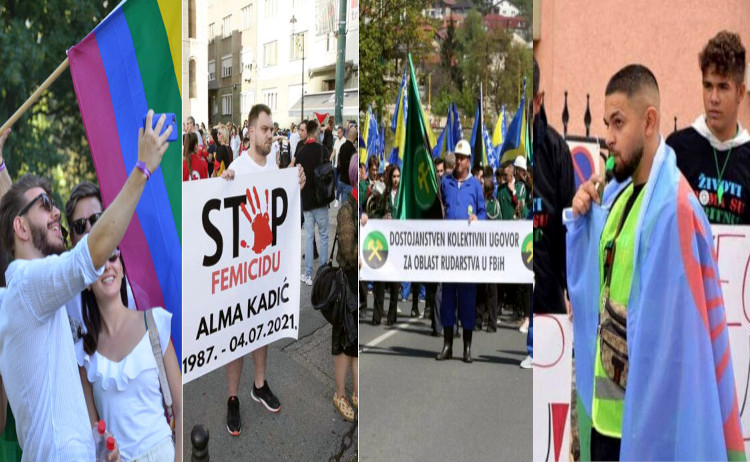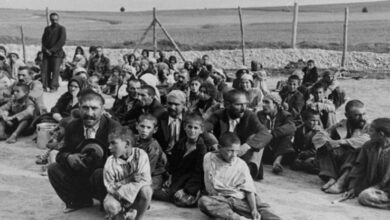Why did human rights “disappear” from European integration?
“Moving too fast in the EU integration process can cause us to skip important steps, and politicians get a message or a signal from the European Commission that this is enough. This is a situation that is difficult, or almost impossible, to fix after joining the EU or gaining status, which can easily be more political decisions and less the one based on actual results.”

By Slađan Tomić
“Historical day for Bosnia and Herzegovina”, is the sentence many Bosnian politicians sent a message to the public after the European Council on Thursday gave the green light for the start of BiH's negotiations with the European Union.
The government rubs hands with satisfaction and takes credit for “reforms” that are not so visible in everyday life. Of the four obligations following the European Commission Report from November 2023, three have been met (Agreement with Frontex, Law on Prevention of Conflicts of Interest, Law on Prevention of Money Laundering and Financing of Terrorism), while the Law on Courts has not been adopted.
None of the priority obligations concern human rights, so the question is why the EU does not insist on these priorities.
The next major step on the EU path is the adoption of the negotiation framework, but the prerequisite for this is the fulfillment of the recommended steps from October 2022, which are also stated in the Report for 2024, but without explicit insisting on respect for human rights. When Bosnia and Herzegovina starts opening its first chapters, human rights will come along. The cluster covering human rights opens first and closes last.
Until then, human rights are on hold, although numerous problems with respect for human rights are mentioned in every report of the European Commission.
Journalist Rubina Čengić told Newipe that human rights topics are under the radar because they are generally not talked about, they are not emphasized and highlighted in EU conditions but are “tucked away” in some group goals.
– But they will be on the agenda for sure, one day, within some chapter. But I am not sure in which direction they will be resolved, because this is still the “pray” of local authorities, not the state-level issue – says Čengić.
Earlier European Commission reports discussed human rights in much more detail, it was stated that work must be done to improve the rights of Roma, LGBT people, women, abolish the practice of “two schools under one roof”… However, these issues are not discussed in Sarajevo or in Brussels since November 2023.
Čengić says she is not sure if the state level is ready to deal with issues of two schools under one roof or issues of language, because this is the war/political pray of political parties with which they hold the batons of power at lower levels of government.
– I will remind you that two schools under one roof are said to be the result of the will of the parents, not politics, and I would not be surprised if someone from the EU pretends that it is a democracy, even though the OSCE and other international organizations have clearly said that this is segregation. This government, these political parties that we have now, these “political authorities” do not want to solve it, the EU is important to them, at least what I think, just to say that it is them who achieved it, and to talk about the billions they “can withdraw”. But BiH's road to the EU will be long and there is time for many things to change, including the politicians, who knows – says Čengić.
Asked about how much BiH can progress in the field of human rights, Leila Bičakčić, director of the Center for Investigative Journalism, which is part of the Initiative for Monitoring the European Integration of BiH, said that, to begin with, all of us as citizens must not be satisfied with the fulfillment of bare minimum.
– The process of EU integration, especially in the segment of human rights, should be seen as a process in which institutions, legal framework, and practice will be strengthened, and not as a final goal after which their respect will be implied. Moving too fast in the EU integration process can cause us to skip important steps, and politicians get a message or a signal from the European Commission that this is enough. This is a situation that is difficult, or almost impossible, to fix after joining the EU or gaining status, which can easily be more political decisions and less one based on actual results – says Bičakčić.
None of the adopted “EU laws” concerned human rights, so the question is whether BiH politicians are even interested in human rights. For Bičakčić, the interest of locals, as well as politicians from the region, in human rights is limited to the level of their political valorization.
– On the other hand, very rarely during political campaigns we had the opportunity to see or hear how those who are running for our representatives plan to work on human rights. In societies that face economic challenges daily, the issue of human rights is not usually high on the list of public discussion, where it is most often found only when we have an incident serious enough to trigger it. This is exactly why the EU integration process is important, which will ask politicians to put these issues back on the daily agenda if we want to meet the minimum we talked about. Everything beyond that is up to citizens and civil society to seek and fight for their voices to be heard. In countries like Bosnia and Herzegovina, human rights are not guaranteed, but we have to fight for their respect – adds Bičakčić.
Lawyer Emina Zahirović Pintarić told Newipe that the rights of LGBT people, activists, and vulnerable groups are part of EU integration and are covered by key priority 13, Improve the protection and inclusion of vulnerable groups, especially people with disabilities, children, LGBTIQ people, members of the Roma community, detainees, migrants and asylum seekers, as well as displaced persons and refugees to close Annex VII of the Dayton Peace Agreement. BiH de jure is working on these issues, but not enough.
– Formally and legally, BiH is slowly harmonizing its legislation with this priority (law on the prohibition of discrimination, criminal legislation, etc.), however, the implementation in practice is not satisfactory. In July 2022, the Council of Ministers adopted the Action Plan on the Rights of Lesbian, Gay, Bisexual, Transgender, Intersexual and Queer Persons (LGBTIQ), which was created in 2020. Achieving its goals requires active and persistent engagement. Although the legislation is harmonized and includes provisions on hate crimes based on sexual orientation and gender identity, the efficient application of the provisions of the criminal law through the prosecution of hate crimes and hate speech against LGBTIQ persons is still insufficient – says Zahirović-Pintarić.
She adds that no steps have been taken to recognize and ensure the social and economic rights of same-sex couples, including the right to family life.
– The social inclusion of intersex and transgender people, who are still particularly marginalized, has yet to improve. In March 2023, the local police banned the LGBTIQ pride parade in Banja Luka and did not protect the activists from physical attacks, nor were the perpetrators prosecuted. Harmful comments by senior politicians and public figures against the LGBTIQ community contributed to this development – reminds Zahirović-Pintarić.
When asked how much the state is ready to work in these fields and whether any “reform” is good, Zahirović-Pintarić answers: “I think that our legislators are not ready to deal with these issues and will leave them until the last moment, when they no longer have the choice but to address this priority as well, but in a perfidious way, as was done with the Aliens Act, where we formally and legally met the required conditions, but with serious violation of international human rights law.”
When will human rights be on the agenda?
In the past days and weeks, numerous officials of the European Union praised the work of the local authorities. Progress, as they say, is greater in just one year than in the past 10 years. However, while most of the talk these days is about technical details, we should also be reminded of BiH's obligations in the field of respect for human rights. We also asked Dragan Tilev, state advisor for European integration at the Secretariat for European Integration of the Government of North Macedonia, when it will be on the agenda. He says that these issues have been on the agenda since the very beginning.
– Now, as soon as the negotiations open, it will become even more visible, and the focus from the very beginning to the end of the negotiations will always be on the Foundations cluster, where the rule of law is an integral part. These are Chapter 23 – Judiciary and Fundamental Rights, and Chapter 24 – Justice, freedom and Security – explains Tilev.
He adds that these issues will remain on the agenda as a priority.
– Chapter 23, in the part of fundamental rights, defines all rights established by international treaties in which Bosnia and Herzegovina participates or will have to participate, which cover the rights of every member of minorities, including regulations and mechanisms against torture, protection of personal data, right to free expression, right to association and protest, freedom of religion, right to property, non-discrimination, hate speech, rights of persons with disabilities, LGBTIQ+ persons, equality and rights of women and children, rights of the Roma community, and protection of all individuals belonging to minority communities – says Tilev.
How interested is the EU in the human rights of BiH citizens?
Key progress and reforms took place between the two reports of the European Commission, the one from the end of 2023 and the last one from March 2024. Many EU officials came to Sarajevo to put pressure on BiH politicians to work on the adoption of laws and reforms. However, there was no pressure to work on increasing the level of realization of human rights, so the question is how important the human rights of BiH citizens are for the EU.
An expert in European law and former chief legal advisor to the negotiating team of the Government of the Republic of Serbia, Vladimir Međak, told Newipe that at this moment geopolitics has entered the decision-making process on enlargement, so this will also lead to a shift in the focus of the EU's attention from standards to geopolitical matters.
– However, the EU cannot and does not want to make concessions when it comes to acceptance and respect of EU values (defined by Article 2 of the Treaty on the EU), which, in addition to the rule of law, democracy, functioning of democratic institutions, also include basic rights. The EU must not make concessions here, because then it would make the problem it already has with some member states even bigger, where the rule of law and the state of human rights are declining. In such circumstances, a lack of progress in that area would lead to a deadlock in the negotiations – Međak believes.
Tilev says that human rights are the basis of EU negotiations and that they are the first and the last goal.
– You may have registered inconsistencies when you start the negotiations, but during the negotiations, all these inconsistencies will have to be eliminated, this will be a condition for progress in the negotiations – says Tilev.
In addition to pressure from Brussels, public pressure and a more professional judiciary is also necessary for progress in human rights.
-We can expect a greater degree of respect for human rights when high-ranking civil servants and politicians start being responsible for their discriminatory statements when collective awareness begins to develop that hate speech and incitement to violence are not the same as freedom of speech, that traditional and conservative values do not have priority in relation constitutionally guaranteed human rights. And for all this, we need an independent and efficient judiciary – says Zahirović – Pintarić.
Human rights are crucial for the EU, our interlocutors agree. The authorities will have to work more seriously on these issues, now the only question is when. Until then, the public will be occupied with “more important” issues such as where will be the headquarters of the Appellate Department of the Court of Bosnia and Herzegovina – in Banja Luka or Istočno Sarajevo.
(Newipe)





